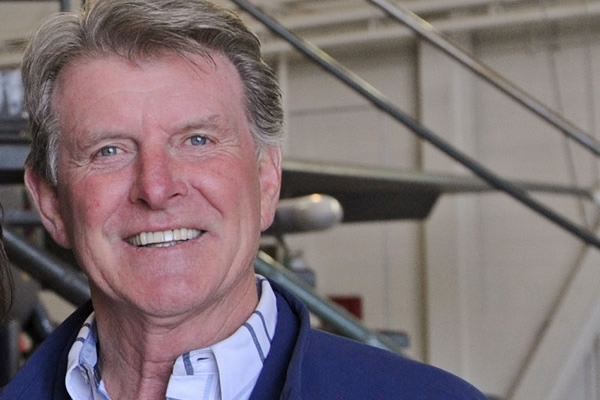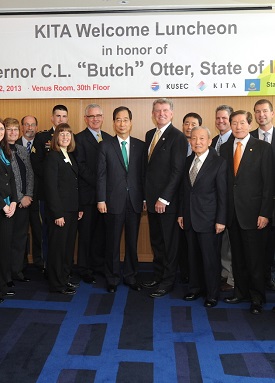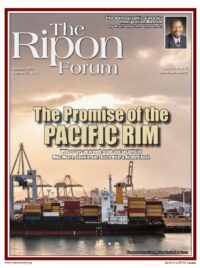
Free, fair and balanced bilateral trade is critically important to the state of Idaho and the United States. For Idaho, nowhere is this statement more applicable than the Asia-Pacific.
Eight of Idaho’s top 10 export destinations are in the Asia-Pacific and more than $5.4 billion (nearly 90 percent) of Idaho’s $6.1 billion a year in exports can be attributed to Asia-Pacific Economic Cooperation (APEC) member nations. More than 60 percent of total U.S. exports are directed at this vital region. These statistics not only punctuate the importance of the Asia-Pacific for trade, but starkly highlight its strategic importance for our economic security.
As Idaho’s Governor and former Lieutenant Governor, I have led many trade missions of Idaho businesses and assisted hundreds of companies to get a foothold in international markets. As a private business professional, I traveled to more than 80 countries, including all of the key markets in the Asia-Pacific. In both roles, I learned that nearly all successful business partnerships are built upon personal relationships of trust, and that continuity and longevity are critical for long-term success.
Eight of Idaho’s top 10 export destinations are in the Asia-Pacific and more than $5.4 billion (nearly 90 percent) of Idaho’s $6.1 billion a year in exports can be attributed to Asia-Pacific Economic Cooperation member nations.
In April 2013, I led a trade mission of 18 Idaho companies to Seoul, South Korea; Taipei, Taiwan; and Ho Chi Minh City, Vietnam. In each country I found the presence of a U.S. governor and motivated companies was warmly welcomed. The United States has a tremendous opportunity to build upon existing goodwill to create new markets for our products and services, create stable jobs here at home and provide competitive prices for goods and services to our citizens.

The first stop on our mission was Seoul, where I had the honor of laying a wreath honoring those Idaho servicemen who lost their lives during the Korean War more than 60 years ago. In the following two days of business and government meetings, I was reminded that U.S. military sacrifices, as well as humanitarian and diplomatic efforts in the region, have neither been ignored nor forgotten. In fact, Korean businesses and government leaders are more excited than ever to take advantage of the recent passage of the Korea-U.S. Free Trade Agreement (KORUS-FTA). This agreement will create new sources of wealth for our citizens and build relationships of trust needed to address larger international challenges.
Our next stop was Taipei, a market where – in addition to our ever-growing trade relationship with mainland China – Idaho has maintained a presence for nearly 25 years. Idaho’s long-term business relationships in Taiwan have resulted in many mutually beneficial outcomes. Idaho is a major exporter of semiconductors, wood products, paper, wheat, potatoes, meat, dairy products and fresh fruit to Taiwan. At the same time, Idaho-based Micron Technology – the largest memory manufacturer in the United States – now is Taiwan’s largest U.S. foreign direct investor. Through years of building relationships, Idaho and Taiwan stand together poised for new areas of opportunity.
Earlier this year, the U.S. granted visa-waiver status to Taiwan visitors to the United States, an act which can only serve to facilitate new opportunities in foreign direct investment, recreation, tourism and higher education.
The final stop of Idaho’s Asia Mission was Ho Chi Minh City. While Idaho’s relationships with Vietnam are still maturing, I could not help but notice how much the country has changed since my first trade mission in 2008. With a population of more than 90 million, more than 44 percent of whom are under the age of 25, the Vietnamese market holds great potential for growth.
With a population of more than 90 million, more than 44 percent of whom are under the age of 25, the Vietnamese market holds great potential for growth.
Less than two generations after the end of the Vietnam War, Boise State University pioneered an effort to set up the first western MBA program in Vietnam in conjunction with The National Economics University. The program has helped train a generation of Vietnamese business executives with the necessary skills to do business anywhere in the world. Their personal preference, however, is to collaborate to work with their former Idaho classmates and friends from the United States. Again, it is personal relationships that help build a solid foundation for successful business and the opportunity for greater cooperation and cultural exchange between the United States and Vietnam.
In the turbulent years since September 11, 2001, skeptics may suggest that the United States is more interested in disarming terrorist threats than in building the business relationships necessary for economic prosperity and mutual understanding. From Idaho’s perspective, I can report that goodwill toward the United States in the Asia-Pacific is indeed alive and well.
The Asia-Pacific is “open for business” and the Obama administration and Congress would do well to encourage future agreements in the Asia-Pacific such as the KORUS-FTA and the Trans-Pacific Partnership (TPP). Through these kinds of agreements, we can add to a strong foundation of cooperation and trust that has been built in the Asia-Pacific.
C.L. “Butch” Otter is the Governor of Idaho.




